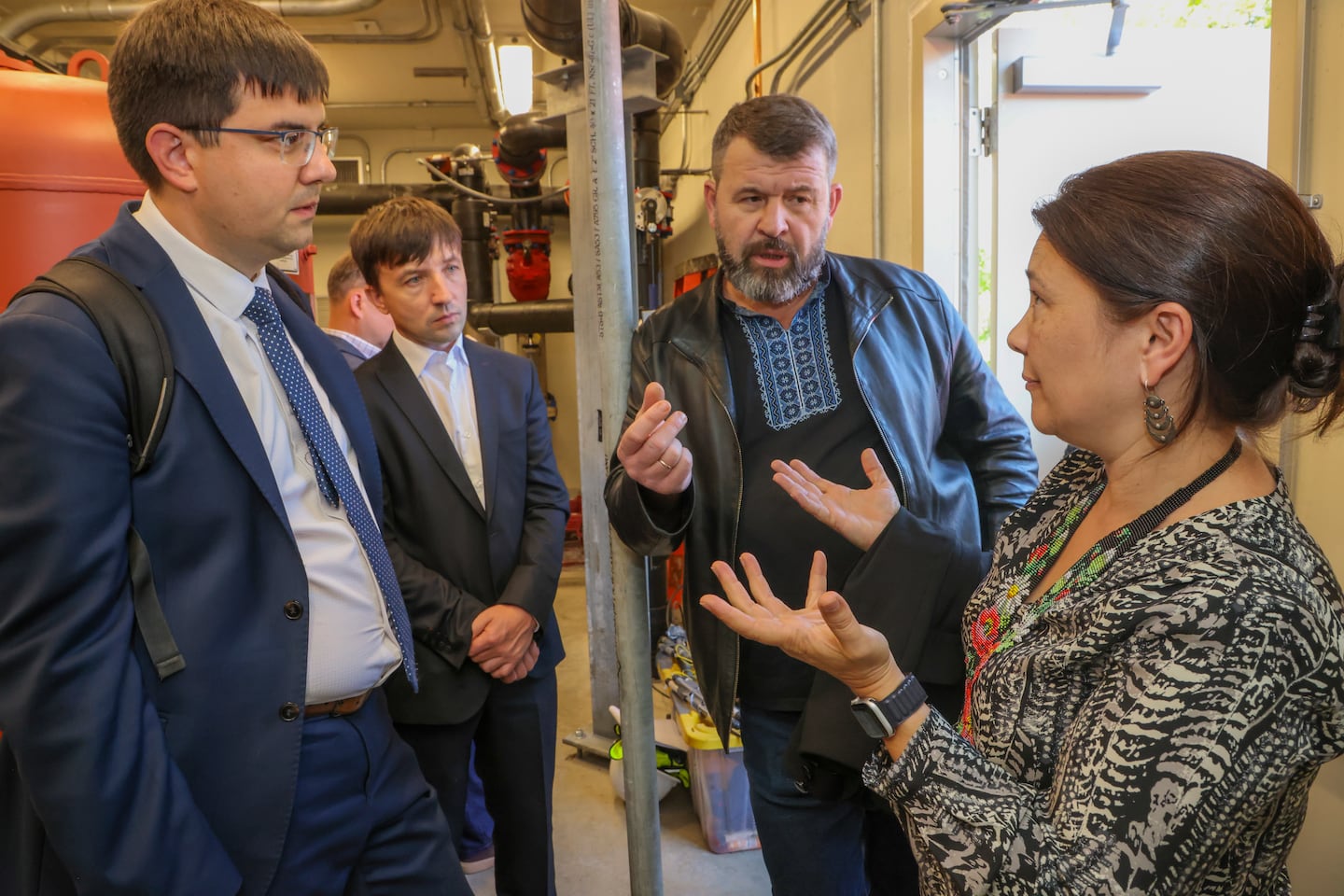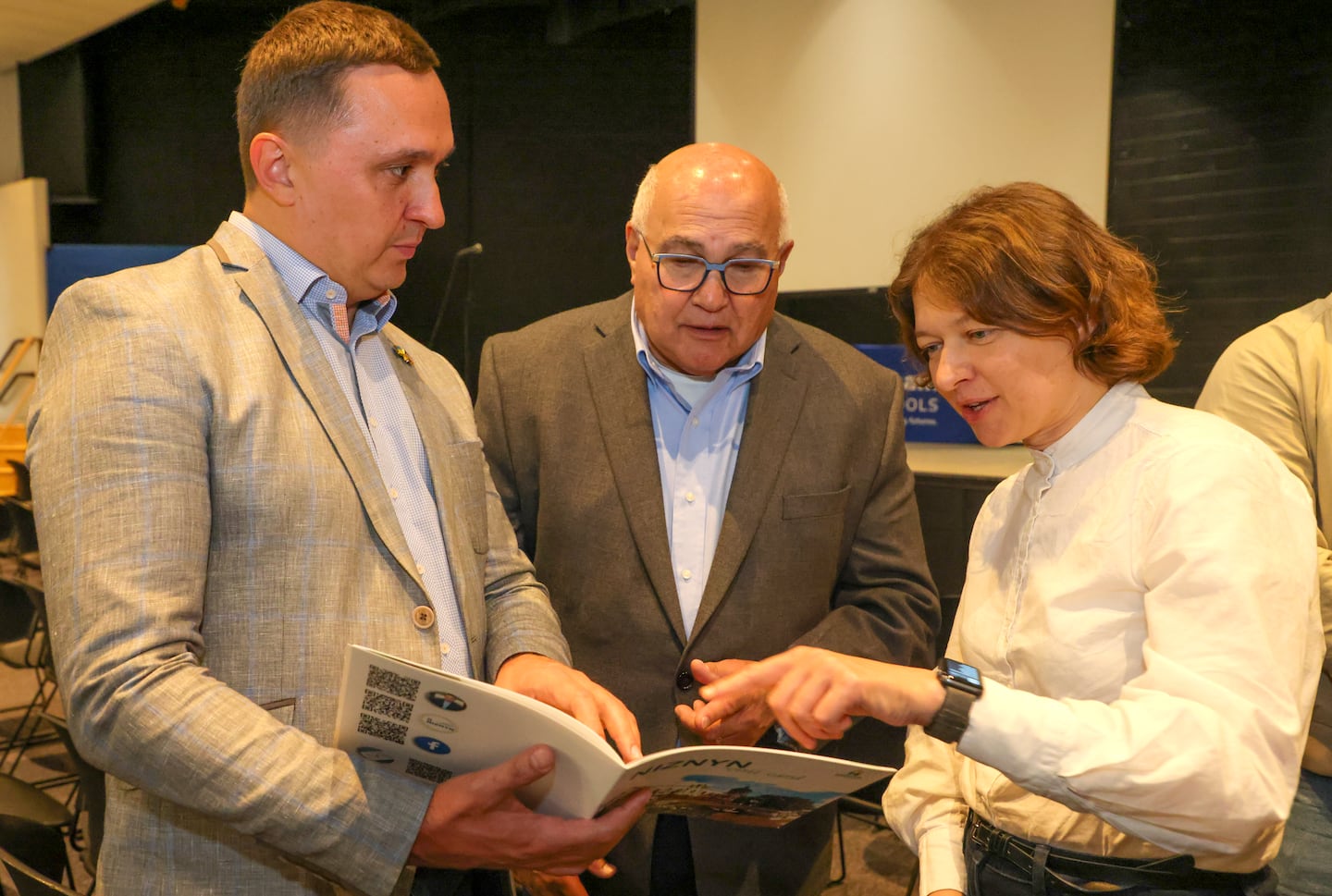As they prepare to rebuild after the war, Ukrainian delegation visits Mass. to study geothermal energy
September 21, 2024
FRAMINGHAM — In a nondescript parking lot a long way from home, a cohort of Ukrainian officials huddled inside a shed beside a local public school building. They had come to study a novel innovation: the United States’ first geothermal heating network installed by a gas utility company.
Even as war rages in their home country, the group spoke boldly of victory, and all that would have to follow. And so the delegation traveled 4,500 miles to Greater Boston this week to research what role renewable energy could play in transforming their bomb-shattered cities into energy-resilient ones.
“First we need to liberate the land, then we must design plans for our cities … or for the ruins, rather,” said Roman Nitsovych, research director at the Ukrainian think tank DiXi Group, which organized the trip. “The government is preoccupied with fire-fighting and short-term concerns, but someone needs to be thinking about the future.”
Geothermal energy, which relies on the steady temperature below ground to heat and cool buildings, is a decades-old technology. The Ukrainian delegation chose to visit Framingham specifically to learn how developers, public officials, and climate activists teamed up with utility company Eversource to devise a plan to link multiple buildings to the same thermal network — and persuade a gas company to build the infrastructure for a renewable energy source.
In Framingham, a mix of water and antifreeze flows through a mile-long loop buried just below the ground in a neighborhood of residential and commercial properties, connecting to a heat pump for each building to heat and cool them.
The group from Ukraine fired questions at Eversource’s geothermal pilot program manager Eric Bosworth and Framingham Mayor Charles Sisitsky about the project, which went live in June. How long did it take to drill holes into the bedrock under the parking lot? How much did it cost taxpayers? What are the maintenance requirements? Was there widespread community support?
Earlier in the day, they had a more pointed inquiry: What happens if you bomb the heating system?
“As you can imagine, I’ve never been asked that question before,” said Zeyneb Magavi, executive director of the Boston-based clean energy nonprofit HEET, which hosted the delegation Monday. Ultimately, she determined the risks to the pipes underground are “about the same as to your water system, and the good news is that if one loop [piece of the network] is taken out, the rest keep going … which is what makes geothermal networks very resilient.”
Magavi and her team pushed hard for years to create a pathway for natural gas providers in Massachusetts to pivot to geothermal. Several European countries have used geothermal energy to heat and cool their buildings for decades. But as representatives of a nation looking toward reconstruction, the Ukrainian delegates found it helpful to watch the process in real time, in a place trying to launch widespread geothermal networks for the first time.

“We have mostly natural gas in Ukraine, except for maybe one or two private buildings that have their own separate systems,” said Vasyl Novachok, deputy mayor of Khmelnytskyi, a city in western Ukraine, who said he believes the geothermal network pilot in Massachusetts could be replicated back home. “It’s still a very new technology [to us] … but it’s very interesting.”
A 2022 state utilities report projected that roughly a quarter of Massachusetts buildings will rely on geothermal networks as a means of decarbonization by 2050. One major draw to the technology, according to national research, is that as temperatures change with the seasons, geothermal heating networks can provide a steadier supply of energy than air-source heat pumps, meaning less strain on the grid.
Department of Public Utilities Chair James Van Nostrand told the group that in addition to the electrical grid benefits, it’s “very advantageous for gas companies to transition to geothermal because it requires a lot of the same skills. You don’t have the same case necessarily for air-source heat pumps.”
In a meeting with city officials in downtown Boston, the Ukrainian delegation also learned about a public-private partnership playing out between the city and National Grid at a public housing complex in Dorchester.
“We own the buildings, and a private company owns the geothermal infrastructure under the ground, but we worked together and cooperated on funding a change to a different system,” said Boston’s climate chief, Brian Swett.
While Ukraine doesn’t currently have widespread public housing, Nitsovych said that is likely to change in the aftermath of the war due to the amount of displacement and private homes that have been destroyed. A resilient heating system would likely be a priority for the Ukrainian government postwar, he added, since the country’s current heating systems have also been repeated targets of Russian bombs.
“They specifically want to destroy our heating plants before the winter,” he said. “We need to restore our district heating systems using build-back-better principles, and geothermal could be an option.”
Nitsovych noted, however, that while efficiency will be critical to reconstruction and combating climate change, political leaders may want to look first to fossil fuels as an easy way to restore the country’s energy infrastructure.
“When you’re focused on survival, you’re not so worried about your [carbon] emissions,” he said. That’s why, for him, it’s important to start researching renewable alternatives early.

Olena Pavlenko, president of DiXi Group, added that because Ukraine intends to join the European Union (it applied for membership in 2022), it will be expected to meet the EU’s commitment to decarbonizing 40 percent of its heating in all member nations by 2035.
“You can’t use coal or gas. And biomass or biogas won’t be enough. So this [geothermal] technology needs to be explained to stakeholders,” she said. “When it comes to a green recovery, we want to think not only of what we should do that can last for the next 10 years, but for the next 50 or 60 years.”
Magavi said she was hopeful for the nation’s reconstruction, and told the visiting delegates that the resources they need are already back home, just waiting to be tapped.
“In Sweden, which is even further north than us [in Massachusetts], 40 percent of homes are using geothermal energy for heat,” she said. “It’s 50-year old technology. I guarantee it works in Ukraine.”
Ivy Scott can be reached at ivy.scott@globe.com. Follow her @itsivyscott.
Search
RECENT PRESS RELEASES
Related Post




